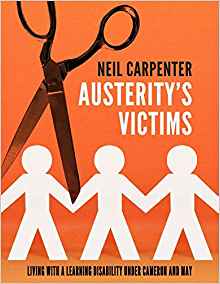Living with a learning disability now
 In this guest blog, Neil Carpenter talks about his new book Austerity’s Victims.
In this guest blog, Neil Carpenter talks about his new book Austerity’s Victims.
I’ve been lucky: after university and a variety of teaching jobs in England and abroad, I’m now enjoying a comfortable retirement in Cornwall.
Roughly 1,000,000 adults with a learning disability in this country are not so lucky, and since retiring I’ve worked for six years as a volunteer advocate with some of them. I go into day centres, help run a drop-in advocacy session, and visit people in their homes.
 My book, Austerity’s Victims, which has recently been published, is based on that experience and was triggered by my impression when I began work as a volunteer that nearly everyone I met seemed poor, as if poverty was an almost inevitable part of having a learning disability.
My book, Austerity’s Victims, which has recently been published, is based on that experience and was triggered by my impression when I began work as a volunteer that nearly everyone I met seemed poor, as if poverty was an almost inevitable part of having a learning disability.
I wanted to see if that impression of poverty was accurate, and the book is a detailed account of what I found, aiming to show how these people have been affected by austerity since 2010.
I’ve concentrated on five men in Cornwall – Frank, Les, Thomas, Mark and Danny – precisely comparing their income and spending with national and county averages. I also examine their quality of life as the support they’re given shrinks.
The five men, all of whose names have been changed, are very different: they’re aged between nearly 30 and over 60 ; their family support varies from nothing to comprehensive back-up; some attend a day centre while others receive support at home; and they have a range of conditions (including autism and brain damage at birth) to contend with.
In those five case studies, I’ve compared the men’s spending not just with UK and Cornwall medians but also with the Joseph Rowntree Foundation’s Minimum Income Standard which is ‘what you need in order to have the opportunities and choices necessary to participate in society.’ Or, put more bluntly, ‘a minimum is about more than survival alone’.
The men’s spending averages 48% of the UK median, 55% of the Cornwall median and 71% of the Minimum Income Standard. It goes without saying that their income is below the relative poverty threshold.
From the case studies, other common features stand out as well as relative poverty.
- All the men have had their support hours at home or their day centre attendance cut. The three who have support hours have seen them reduced by an average of 27%. The other two attend day centres: Mark now has his place only half-funded; Danny has had Adult Social Care funding removed completely.
- When the book was published, two of the five men had had their benefits cut: Frank failed to have his Disability Living Allowance transferred to Personal Independence Payment; Danny, who suffered a life-changing brain injury in 1980, was suddenly deemed 36 years later to miraculously have changed and therefore be fit for work without his Employment and Support Allowance. Since publication, Thomas has also fallen foul of the system.
- To state the obvious, their quality of life has suffered. They lack the friends that most of us take for granted and so loneliness is a real problem. As Les, one of the men in the book, says to me time and again: “It’s the evenings I can’t stand.”
For all the men in the book, their lives fall a long way short of the ‘wellbeing’ the 2014 Care Act says they should be experiencing. One component of ‘wellbeing’ is ‘personal dignity’. If you read the chapter on Danny and his Work Capability Assessment, his tears at the initial outcome show how little ‘respect’ (another word from the Care Act) he was given. ‘Personal dignity’ doesn’t even come into it.
Is this really how a ‘caring’ society should treat people like Danny? The answer has to be no.
Incidentally, my aim is not to make a profit on sales but rather to get through to as many readers as possible and show how poorly people with a learning disability are treated. The print version of Austerity’s Victims is therefore for sale at cost price and the e-book version at only 99p.

As the author of the post, ‘Living with a Learning Disability Now’, I’m happy for anyone who would like to contact me to email killingyousoftly@outlook.com
Neil Carpenter